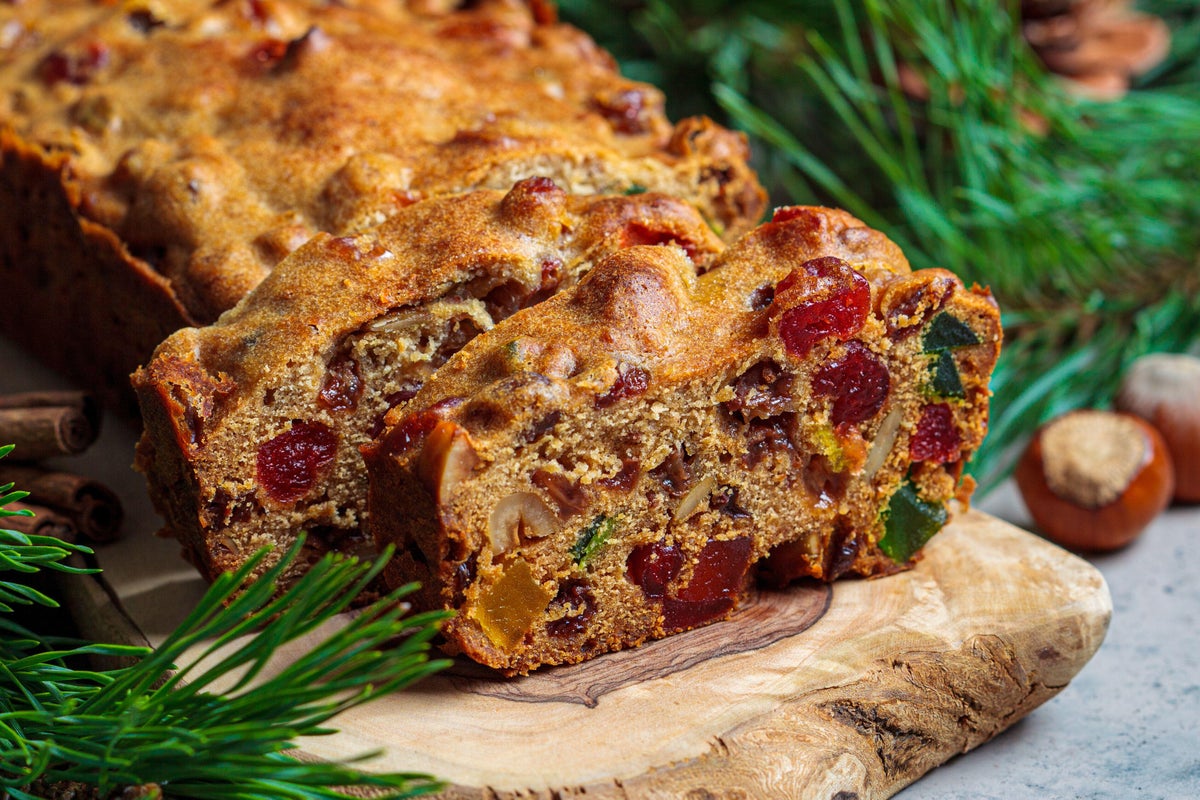
The humble fruitcake has stood the test of time—both culturally and scientifically. One of the earliest references to the dessert dates to the Ancient Romans, who used it like an energy bar and filled it with pomegranate seeds, raisins, honey and wine. Soldiers in World War I also fancied a version of the baked treat: wrapped in wax paper, this small fruitcake provided some morsel of nutrients when many other foods would spoil during long stretches in barren battle trenches.
Nowadays fruitcakes are a holiday delicacy still prized for their long-lasting freshness. According to the U.S. Department of Agriculture, these seemingly indestructible pastries typically stay fresh for six months in the pantry and up to a year when refrigerated. But anecdotally we know that they can last for decades; some of the oldest have been preserved for more than a century. In 2017 a then 106-year-old fruitcake left behind by members of a 1910 Antarctic expedition was unearthed from one of the continent’s first buildings. And in 2019 the Detroit News reported that a Michigan family treasured a then 141-year-old fruitcake as an heirloom. And you could theoretically still eat these century-old cakes without harm—if you can get past the nauseating, rancid smell.
The secret behind the long shelf life of the beloved (or sometimes despised) holiday treat lies in the ingredients and preparation. Scientific American spoke to food scientists about what makes an edible item seemingly indestructible and whether it’s a good idea to eat a fruitcake that has been saved up for years.
Sugar and alcohol create a hostile environment for microorganisms
One ingredient that bolsters fruitcake’s longevity is alcohol, says Bryan Quoc Le, a food scientist and faculty research fellow at Pacific Lutheran University. Many classic home recipes involve soaking the cake in rum, brandy or bourbon—liquor that can add some flavor but is mostly used for its antimicrobial properties. Alcohol makes a fruitcake more acidic, creating a harsh environment for many common foodborne microbes. Booze destroys the cells of many bacteria, mold spores and other potential pathogens that survive the baking process or accumulate when food is left out at room temperature.
But even though alcohol is common in traditional homemade recipes, commercially prepared fruitcakes rarely contain it, notes Benjamin Chapman, head of the agricultural and human sciences department at North Carolina State University. The shelf life of an alcohol-free fruitcake is likely shorter than one prepared with spirits.
The fruit in a fruitcake is often dried instead of fresh, which reduces moisture and creates this dessert’s notoriously dry texture. This, along with the high sugar content, sucks up much of the water that bacteria need to survive. “Foods with low amounts of moisture, like fruitcakes and Twinkies, are resistant to the growth of microorganisms because you need a certain amount of moisture for spoilage and pathogenic microorganisms to grow,” Le explains. “If you can get rid of the moisture, you have something that’s nearly indestructible.” The lack of water is one reason why one unwrapped Twinkie dessert has lasted for at least 43 years despite having had a shelf life of just days when it was produced. Chapman also says commercially prepared fruitcakes and Twinkies have antibacterial and antifungal preservatives to increase their shelf life.
A fruit cake’s dense texture stalls staleness
Fruitcakes have a reputation for being as heavy as a rock. But it’s partly thanks to this high density that they stay fresh longer than breads and cakes with light, fluffy textures, Le says.
The interplay between density and moisture influences how quickly foods become stale. When bread is baked, water in the dough rearranges starch molecules from a rigid structure to a disorganized one that helps to form air pockets. Baked goods made with wetter dough have more air pockets, which create a soft, light texture. But the porousness also exposes more starches to the outside air, which draws out water and eventually shuffles the starch molecules back into a solid crystalline structure. The resulting rigidity makes once-supple baked goods stale and tough to chew. Fruitcake’s denser texture allows far fewer air pockets to form, protecting more of the starches from the air.
Could you stomach a 50-year-old fruitcake?
Like a fine wine, a well-made fruitcake can actually get more flavorful over time. Tannins ooze out of the dried fruit, chemically changing the cake’s composition to produce a fruity and spicy taste. Some bakers recommend intentionally aging fruitcakes for a few weeks to months in a cool, dark place to enhance the taste and texture. But these pleasant, complex flavors only last about a year or two, Le says. This is because of oxidation, a process whereby chemical reactions between the food and oxygen transform unsaturated fatty acids into compounds called lipid hydroperoxides. Further breakdown of these compounds creates smaller molecules such as aldehydes and ketones, which can create bitter or unpleasantly leatherlike flavors and aromas. “The likelihood that any of the fats in a [50-year-old] fruitcake are not oxidized or rancid is pretty low,” Chapman adds.
That said, even though a decades-old fruitcake might taste like a leather shoe, eating it probably won’t make you dangerously sick. Chapman says the dessert’s characteristic resistance to pathogen growth greatly reduces the risk of foodborne illnesses from Escherichia coli or Salmonella bacteria—though people might become nauseous from the smell and flavor. While the 50-year-old dessert would probably taste pretty terrible, he adds, “the fruitcake is no less safe now than the year it was baked.”
Despite fruitcake’s well-preserved status, it’s not always the most popular item on the holiday dinner table. The dessert has gained a reputation for being the gift no one likes to get—but it can be the gift that keeps giving. If you receive one this Christmas, know that you have next year (and every year after) to discreetly regift it.
Read Again https://news.google.com/rss/articles/CBMiS2h0dHBzOi8vd3d3LnNjaWVudGlmaWNhbWVyaWNhbi5jb20vYXJ0aWNsZS93aHktZG9lcy1mcnVpdGNha2UtbGFzdC1zby1sb25nL9IBAA?oc=5Bagikan Berita Ini














0 Response to "Why Does Fruitcake Last So Long? - Scientific American"
Post a Comment